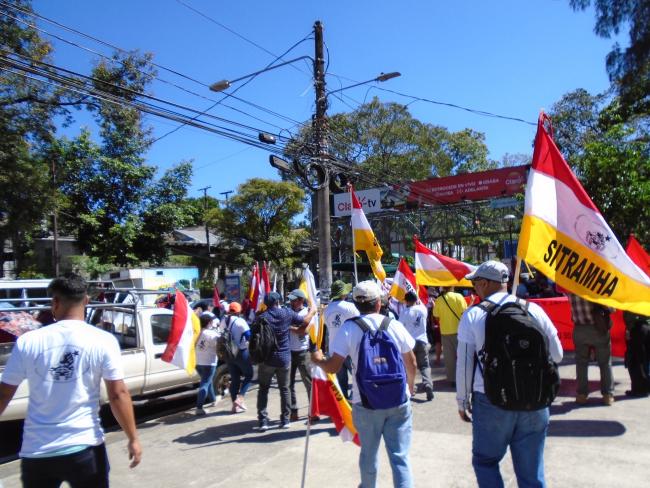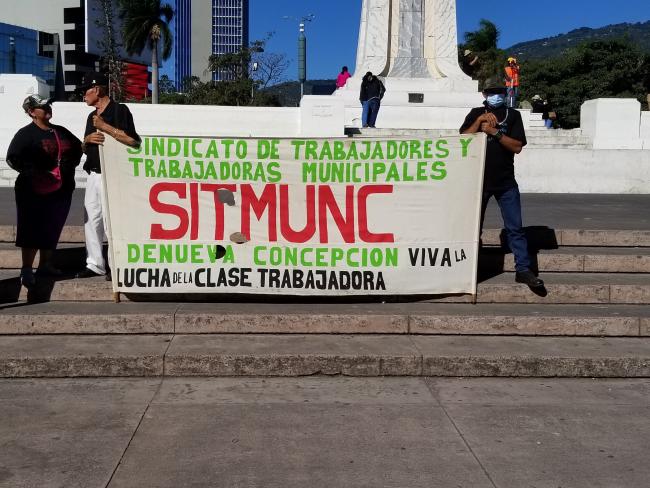
Twice a week, Francisco wakes up early, gathers his bottles, barrels, and water jugs, and drives a mile to collect water from the junta de agua near his house in San Salvador, El Salvador’s capital. Juntas are community organizations that manage water distribution and sanitation, servicing around 1.5 million people in predominantly rural and peri-urban neighborhoods that are not connected to the country’s main water distributor, the National Administration of Aqueducts and Sewers (ANDA). El Salvador’s water network has become increasingly unreliable, with chronic service interruptions affecting both junta and ANDA users nationally. Residents like Francisco, who is identified by his first name to protect his identity, often arrive at their juntas to collect water only to discover that nothing flows from the taps.
“This water crisis means major mental and physical deterioration for workers,” says Francisco. “It’s forcing us to wake up earlier to get water from a junta further away or buy bottled water at the store. We must do all this before going to work. And everything is more expensive. The water stops, but the bills never do.”
Tracing precarious access to water reveals a larger trend faced by millions of Salvadorans: high costs, declining public services, and the constant threats to everyday livelihoods posed by President Nayib Bukele’s state of exception, now in its 16th month.
The state of exception was declared in March 2022, after 87 people were killed in one weekend when secret gang negotiations with the government collapsed. Bukele has since jailed over 70,000 people suspected of gang activity—in some cases on extremely faulty evidence—and constructed the Western hemisphere’s largest jail to house a swelling prison population. His high approval ratings and aggressive approach to security have allowed the populist president to swiftly consolidate El Salvador’s judiciary, legislative assembly, and armed forces.
In June, the government enacted legislation reducing the number of municipalities nationally from 262 to 44. Bukele cites efficiency and anti-corruption as motivating factors behind the change, but political analysts say municipal reduction is part of a broader plan to further concentrate power in Bukele’s favor and gerrymander away municipalities where his party polled badly ahead of next year’s presidential elections. For the nearly 900,000 workers employed in the public sector—and the millions who depend on public services like health care, education, water, and waste management—municipal restructuring signals the elimination of jobs and further deterioration of public institutions.
Municipal Restructuring
Following the 1992 peace agreement that ended El Salvador’s 12 year civil war, successive right-wing governments implemented neoliberal reforms that gutted the public sector, privatized state-owned enterprises, fired tens of thousands of workers, and dismantled some of the strongest and most militant unions.
“The government always sold us the idea that restructuring and privatization means better service,” says Julio, a construction worker in San Salvador. “But they never tell us it will cost more, they never tell us our rights and unions will be taken away, they never tell us about unemployment.”
Since assuming office in 2019, Bukele has cut the budgets for public institutions and reduced personnel by firing almost 20,000 public sector workers in efforts to “root out corruption.” Yet municipal restructuring does not address the underlying causes of corruption and will most likely make services more expensive.
“Corruption is not combated through municipal reduction, but through greater administrative controls,” says Andrés Espinoza, a former municipal official in San Salvador. “Budget austerity impacts the capacity to address community issues, and people will wait longer for services, possibly seeking out expensive, private institutions.”
Austerity measures also open the door to privatization. El Salvador is no stranger to privatization schemes, with telecommunications, banks, and electricity fully privatized in the 1990s. Salvadoran social movements label Bukele’s 2021 Water Resources Law as a form of de facto privatization, due to provisions that promote the corporate commodification of water. Despite Salvadorans demanding more public investment in social and physical infrastructure like schools, hospitals, and water services, Bukele’s administration has steadily chipped away at these institutions.
In April 2021, the government cut funding to the Social and Economic Development Fund for Municipalities (FODES for its Spanish acronym), which financed development projects, scholarships, water infrastructure, and employee salaries. Municipal funds were reduced from 10 percent to 1.5 percent of the state budget’s net income, resulting in public sector workers facing months of backpay and crumbling infrastructure.
Daniel, a public school teacher, says this lack of investment constitutes “a daily fight for vital resources” to address dilapidated working and learning conditions. “In schools, the water pipes have all but collapsed. We sometimes don’t have electricity. Classrooms are falling apart. If we don’t have electricity, or if a kid gets sick at school from drinking water, the state just tells us to temporarily close the school,” he explains.
Given the current trajectory, it is likely that conditions will only worsen. Bukele’s erratic economic policies, like making Bitcoin legal tender and spending millions of public dollars on cryptocurrency infrastructure, coupled with the country’s slow rate of growth, mean the state is teetering on the verge of bankruptcy and in desperate need of revenue streams. Shaving the public sector down to the bone for short-term financial gain will only bring about a decline in the long-term quality of life for ordinary Salvadorans.
In response, El Salvador’s labor unions have organized to demand that the government pay workers and fund public infrastructure and social services. Union workers, in turn, have become a main target for repression under Bukele’s ongoing state of exception.

Bukele’s attacks on the public sector
The president’s disdain for public sector workers has long been evident, but the state of exception presents a dangerous new opportunity for Bukele to ramp up his war against workers. Leaders from teachers unions, dockworkers unions, printing press operators, and water utility workers have been jailed under the auspices of the state of exception, despite no clear connection to gangs. In January 2023, striking municipal workers in several San Salvador suburbs were arrested for demanding months of backpay. Bukele sought to discredit these strike efforts by accusing workers of “threatening the environment and public health of taxpaying Salvadorans.” Under the state of exception, this kind of rhetoric is used as a tool to justify arrests and silence opposing voices.
Workers also face threats when they shed light on decaying infrastructure. To draw attention to the neglect in the public school system, Daniel explained that his union photographed the terrible conditions of their schools and posted them on Facebook. “For that, we were threatened by the Ministry of Education with sanctions if we didn’t take the photos down,” he says. “They don’t want people to know.”
More ominously, unionists have received menacing home visits from the police and military to intimidate workers. “We threatened strike action because the government hadn’t paid us for months and we have expensive bills. Later, the police came looking for me at my house,” says a public sector worker who wished to remain anonymous due to concerns about their safety.
Labor rights and public services are being massively curtailed under the Bukele administration, and unions worry that municipal restructuring will bring further repression. The unions, however, aren’t backing down. Workers are resolute that strong public institutions are critical for a healthy democracy, and attacking unions who defend them is an attack on all Salvadorans who depend on those public services.
Workers fight back
The Bukele government is careening down the austerity road, and workers are demanding improvements to public infrastructure and wage increases to keep pace with rising costs of living. These are expensive demands the government says it can’t—or won’t—fund, so workers have ramped up the pressure.
In the workplace, unions have used strikes and work stoppages to demand pay raises, back pay, pension reform, better working conditions, and an end to labor violations. Many of these fights are ongoing, but workers have managed to win some key struggles. Doris, who prefers to be identified by a pseudonym, works near the University of El Salvador. She described the effects of a mainline water pipe that burst near her workplace.
“All of us had gone weeks without water, same as everyone in the neighborhood,” she explains. “So, the union decided to fight to get it fixed. We even turned off our machines so the bosses would see we were serious.” Doris says the intervention was effective, and managers later called ANDA to come and replace the pipes.
Outside the workplace, labor-led marches like Salvadoran Trade Unionist Day, celebrated on October 31, protests in support of a dignified pension, and International Workers Day on May 1 attracted thousands of supporters. Unions have joined their labor struggles with other social movement causes, demanding the government address the water crisis, end campesino land expropriation, release jailed environmental activists and other innocent people arrested under the state of exception, and reject Bukele’s unconstitutional bid for reelection in 2024.
The role of any state is to provide vital goods and services. While Bukele maintains a tight grasp on security for the time being, everyday life includes a myriad of necessities. Any effort to measure his policies beyond policing demonstrates how little Bukele’s administration has confronted inequality and economic precarity, and the root causes of crime that trace back to civil-war legacies he is intent on denying. Over the past four years, Bukele has dismantled hard-fought efforts to build democratic norms and institutions, brought the economy near collapse, threatened press freedom, and fabricated records to suppress a bungled approach to the pandemic.
And public services have worsened, despite government publicity signaling otherwise. After the new water law went into effect, Bukele established the Salvadoran Water Authority, or ASA, an administrative board that he claims will streamline water delivery services for Salvadorans. Yet the reality of water access in practice paints a different picture.
While awaiting an interview with a representative from ASA, I witnessed several people try to register their junta de agua with the new authority to obtain permits for water delivery. They spoke to half a dozen ASA employees, each more baffled than the last, who all kept signaling to others for help. After about 20 minutes, the permit seekers gave up. As they were leaving, I overheard one of them comment to another, “We’ve had this water board for 20 years and it’s never been this confusing.”
Bukele’s media strategies depict an illusion of control that obfuscates an austerity project that continues to harms workers, further deteriorates public institutions, and obscures the process to secure public goods. At this concerning conjuncture, workers and their unions are some of the strongest forces in society fighting to defend public services, demand better living standards, and hold the state accountable to the Salvadoran people.
Claudia Díaz-Combs is a PhD candidate at Syracuse University in the Department of Geography and the Environment. Her work focuses on the politics of water, social movements, and authoritarianism in El Salvador.

